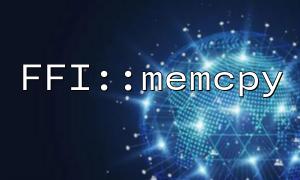In modern PHP development, handling binary data is a common requirement. Binary data is often used for files, images, audio, video, or interactions with low-level systems. Since PHP’s native type system does not directly support binary operations, developers rely on extensions and techniques to improve efficiency. FFI::memcpy is a function provided by PHP’s FFI (Foreign Function Interface) extension that allows PHP to directly interact with C function libraries, enabling efficient binary data handling.
FFI (Foreign Function Interface) was introduced in PHP 7.4, allowing PHP programs to interact with dynamically linked C libraries (DLL or .so files) and directly call C functions. When handling binary data, FFI::memcpy is mainly used to copy data in memory from one location to another.
memcpy is a C standard library function used for efficiently copying data between memory regions. PHP’s FFI::memcpy calls this C function directly via the FFI extension, providing a more efficient method than traditional PHP array operations or memory copying techniques.
Ensure Memory Is Allocated
Before using FFI::memcpy, make sure the target memory space is properly allocated. Since memcpy operates on memory addresses, sufficient space must be prepared in advance. You can use FFI::new() to create a new memory block or manually allocate memory.
<span><span><span class="hljs-variable">$ffi</span></span><span> = FFI::</span><span><span class="hljs-title function_ invoke__">cdef</span></span><span>(</span><span><span class="hljs-string">"void* malloc(size_t);"</span></span><span>, </span><span><span class="hljs-string">"stdlib.h"</span></span><span>);
</span><span><span class="hljs-variable">$buffer</span></span><span> = </span><span><span class="hljs-variable">$ffi</span></span>-><span><span class="hljs-title function_ invoke__">malloc</span></span>(</span><span><span class="hljs-number">1024</span></span>); </span><span><span class="hljs-comment">// Allocate 1024 bytes of memory</span></span><span>
</span></span>Use Appropriate Data Types
When handling binary data, ensure the data type matches your expectations. For example, when passing pointers in FFI::memcpy, ensure the source and destination types match to avoid data corruption or memory leaks.
<span><span><span class="hljs-variable">$ffi</span></span><span> = FFI::</span><span><span class="hljs-title function_ invoke__">cdef</span></span><span>(<span class="hljs-string">"
void* memcpy(void *dest, const void *src, size_t n);
"</span>, </span><span><span class="hljs-string">"string.h"</span></span><span>);
<p></span>$source = "Hello, World!";<br>
$dest = FFI::new("char[64]"); // Allocate sufficient space for the target data</p>
<p>$ffi->memcpy(</span>$dest, FFI::</span>cast(</span>"const char *", </span>$source), </span>strlen(</span>$source) + </span>1);<br>
</span>Avoid Memory Leaks
When using FFI in PHP, careful memory allocation and release are essential. Memory allocated with FFI::new() is not automatically freed, so you must explicitly call the release function to prevent leaks. In C libraries, free() is used to release memory. PHP can also call the C library’s free function to release FFI-allocated memory.
<span><span><span class="hljs-variable">$ffi</span></span><span>-></span><span><span class="hljs-title function_ invoke__">free</span></span>(</span><span><span class="hljs-variable">$buffer</span></span>); </span><span><span class="hljs-comment">// Free the memory</span></span><span>
</span></span>Handle Cross-Platform Compatibility
FFI relies on the C libraries installed on the operating system, so behavior may differ between platforms like Windows and Linux. When writing cross-platform PHP programs, ensure FFI function calls are thoroughly tested, especially for memory management and pointer operations.
Minimize Frequent Memory Operations
While FFI provides efficient memory operations, frequent allocation and copying may affect performance. Unless dealing with very large binary data or interacting directly with low-level systems, consider using PHP alternatives like pack and unpack for binary data conversion to reduce reliance on FFI.
Pointer Operation Risks
When using FFI::memcpy, pointer operations require caution. PHP does not natively support direct pointer manipulation, so accessing memory via FFI must be done carefully to avoid out-of-bounds access or invalid memory usage, which can lead to undefined behavior or crashes.
Memory Size and Alignment
memcpy requires correct memory size and alignment for source and destination. Most platforms assume memory blocks are properly aligned. Misalignment can lead to errors or reduced performance.
Error Handling
FFI::memcpy does not throw PHP exceptions since it executes at the C language level. Developers should check memory allocation success and other potential issues beforehand. Return values or higher-level logic can be used to capture errors.
Performance Optimization
For large-scale binary data, FFI::memcpy is a useful tool and often outperforms traditional PHP array operations. However, careful memory operation management is still necessary. Use memory_get_usage() to monitor memory usage and avoid performance bottlenecks from excessive allocation.
Avoid Confusing PHP and C Memory Management
PHP has automatic garbage collection, whereas C requires explicit memory management. Developers should be aware of the differences when using FFI to avoid memory leaks from allocated memory that is not freed.
FFI::memcpy offers an efficient way to handle binary data in PHP, especially for scenarios requiring direct interaction with C libraries. Careful attention to memory management, data type consistency, and cross-platform compatibility is essential. By following best practices and guidelines, developers can leverage FFI to improve performance and reliability.


